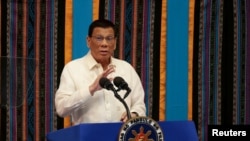Two measures proposed by Philippine President Rodrigo Duterte this week will make another dent in some of Asia’s most entrenched corruption but not solve the problem, experts say.
Philippine President Rodrigo Duterte proposed Monday a new method of taxation along with the eradication of customs brokers — people who help traders ship goods in or out of the country. Duterte has made corruption a top-drawer issue since taking office in 2016.
The Philippines ranked 99 out of 180 countries on the nongovernmental organization Transparency International’s 2018 “corruption perceptions” index, where higher scores go to cleaner countries. Corruption, though easing, remains stubborn in the Philippines because businesses as well as officials from local to central government agencies are in on it.
“There’s no system where human beings cannot creatively go around,” said Eduardo Araral, associate professor at the National University of Singapore’s public policy school. “There’s always some loophole, so it’s just a question of whether the alternative system is slightly better than the old one.”
Old issue
Corruption in the Philippines stands out because it’s “collusive” and involves stakeholders throughout business-government relations, Araral said.
The decades-old problem has been blamed for reinforcing poverty, which affects about one-fifth of Filipinos, by diverting resources that could help the poor. Graft also daunts foreign investors wary of bribes or favoritism. The Philippines ranked 124 of 190 countries on the World Bank’s ease-of-doing-business index this year.
The country lost $410.5 billion between 1960 and 2011 to “illicit financial flow”, according to a report by Philippine media outlet Rappler.com.
“I think if we look at that bigger picture of government efficiency and red tape, still the Philippines hasn’t become competitive with some of the other peers in the region of Southeast Asia,” said Rajiv Biswas, Asia-Pacific chief economist at the market research firm IHS Markit in Singapore. “So, there’s a lot of room for improvement.”
New measures
Duterte vowed during his 2016 election campaign to stop corruption and in December that year said he would pursue a “respite” from the problem.
He suggested on Monday to eliminate customs brokers as a “major source of corruption”, the website says. “Take away the brokers and you would have cut corruption overnight,” the website quotes Duterte saying. This measure would not need congressional approval, it adds.
Duterte probably wants to stop customs brokers to avoid payoffs at shipping checkpoints, Araral said. Customs agents have let in tons of the methamphetamine derivative ice from abroad even while the president is “doing his drug war and catching the users,” he noted.
Duterte is known worldwide for his deadly crackdown on the domestic drug trade.
Last week he announced he would fire 64 customs employees involved in corruption and other abuses.
A system of “gross taxation” instead of “net taxation” would further help stamp out corruption, his website says. “Gross” means taxing income as well as funds in estates and trusts. “Net” refers to taxing production less subsidies and “transfer payments”, the presidential website says.
Tax compliance could come under the broader heading of anti-corruption work, said Christian de Guzman, vice president and senior credit officer with Moody’s Sovereign Risk Group.
“It’s really about paying what you owe,” de Guzman said. “We have a certain degree of transparency in terms of how these companies present themselves to the market, so why should they be presenting something different to the tax authorities?”
Incremental progress
Corruption showed signs of easing under Duterte’s predecessor Benigno Aquino, who tried to bust graft through more transparency and tighter rules on government transactions. During his term, before 2016, citizens with camera phones would also post potential acts of corruption on social media.
The country’s ease-of-doing-business ranking has risen from 134 in 2010. The Philippines' Transparency International corruption perception ranking rose from 111th last year.
Tax collection has improved visibly under Duterte, de Guzman said. He points to revenue generated over the past two years from taxes on fuel and tobacco.
Any long-term effort to stop corruption will require coordination and enforcement, with the police involved, Araral suggested. Otherwise, he said, it will be hard to stop what he called one of the “more pernicious” corruption problems in Asia.




